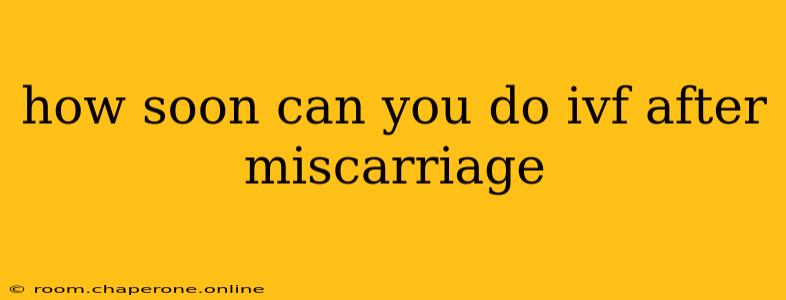Experiencing a miscarriage is incredibly difficult, both emotionally and physically. For couples pursuing IVF, a miscarriage can add another layer of complexity and uncertainty. A common question arises: how soon after a miscarriage can you start IVF treatment? The answer, unfortunately, isn't a simple one-size-fits-all timeframe. It depends on several crucial factors, and prioritizing your physical and emotional well-being is paramount.
Factors Determining the Waiting Period After Miscarriage Before IVF
Several factors influence when it's medically appropriate and emotionally advisable to begin IVF after a miscarriage:
1. Type and Cause of Miscarriage:
- Early Miscarriage: Miscarriages occurring in the first trimester (before 12 weeks) often require less extensive recovery time compared to later miscarriages. However, even early miscarriages necessitate a period of healing.
- Late Miscarriage: Miscarriages later in pregnancy may necessitate a more extended recovery period due to potential complications and the need for more thorough medical evaluation to determine the cause.
- Underlying Medical Conditions: If underlying medical conditions contributed to the miscarriage (e.g., uterine abnormalities, hormonal imbalances), addressing these issues before initiating IVF is crucial. This often involves further investigation and treatment.
2. Physical Recovery:
- Complete Miscarriage: If the miscarriage is complete (meaning all pregnancy tissue has passed naturally or been removed), the physical recovery time is generally shorter. However, your doctor will want to ensure bleeding has stopped and your hormone levels have returned to baseline before considering IVF.
- Incomplete Miscarriage: An incomplete miscarriage requires medical intervention (D&C) to remove remaining pregnancy tissue. This necessitates a longer recovery period before attempting IVF.
- Missed Miscarriage: In a missed miscarriage, the fetus stops developing, but the pregnancy tissue remains in the uterus. This also usually requires medical intervention and a subsequent recovery period.
3. Emotional Well-being:
The emotional impact of a miscarriage shouldn't be underestimated. Allowing yourself adequate time to grieve and process the loss is crucial for both your physical and mental health. Rushing into IVF before you've had sufficient time to emotionally heal can negatively impact the entire process. Consider seeking support from a therapist, counselor, or support groups specializing in miscarriage.
4. Doctor's Recommendations:
The most critical factor is your doctor's recommendation. They will assess your individual circumstances, considering all the factors mentioned above, to determine the optimal time to begin IVF. They might order blood tests to monitor hormone levels and ensure your body is ready for another pregnancy attempt. Always follow your doctor's advice.
Typical Timeframes (with important caveats!)
While there's no universal guideline, some general observations exist:
- After a complete early miscarriage: Some doctors may allow starting IVF as soon as one or two menstrual cycles have passed, allowing for a period of physical and hormonal recovery.
- After an incomplete miscarriage or other complications: A longer waiting period, often three to six months, might be recommended to allow for complete physical healing and a thorough investigation into the underlying cause of the miscarriage.
It's imperative to understand these are just general observations, and individual circumstances can significantly vary.
Prioritizing Your Well-being
Before considering IVF, ensure you've:
- Had adequate time to grieve: This process takes time and varies for each individual.
- Undergone any necessary medical investigations: Determine and address any underlying medical issues.
- Received your doctor's clearance: Your physician will provide personalized guidance based on your unique situation.
The journey to parenthood after a miscarriage can be challenging, but prioritizing your physical and emotional health is essential. Partnering closely with your healthcare provider ensures you make informed decisions about when and how to proceed with IVF treatment. Remember, patience and self-care are key during this sensitive time.

